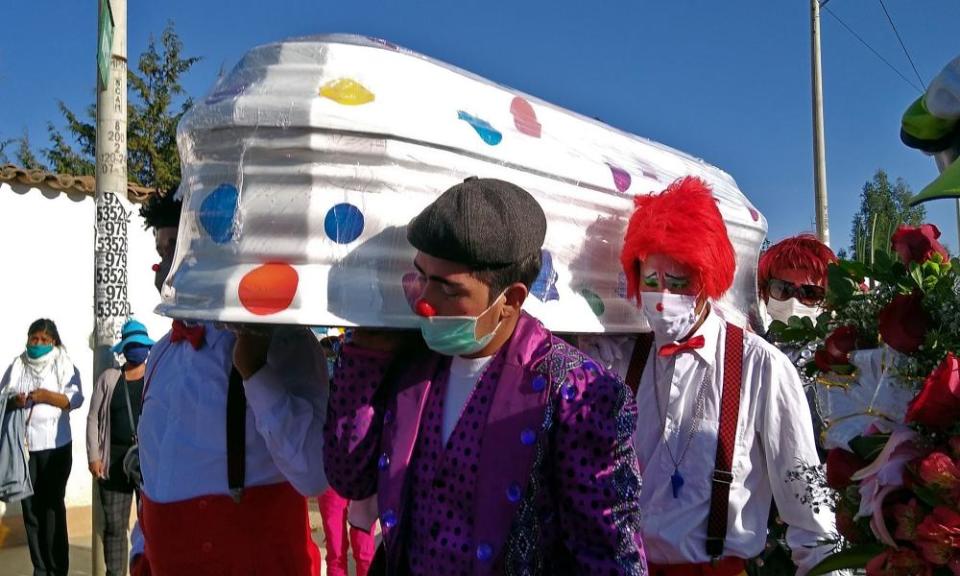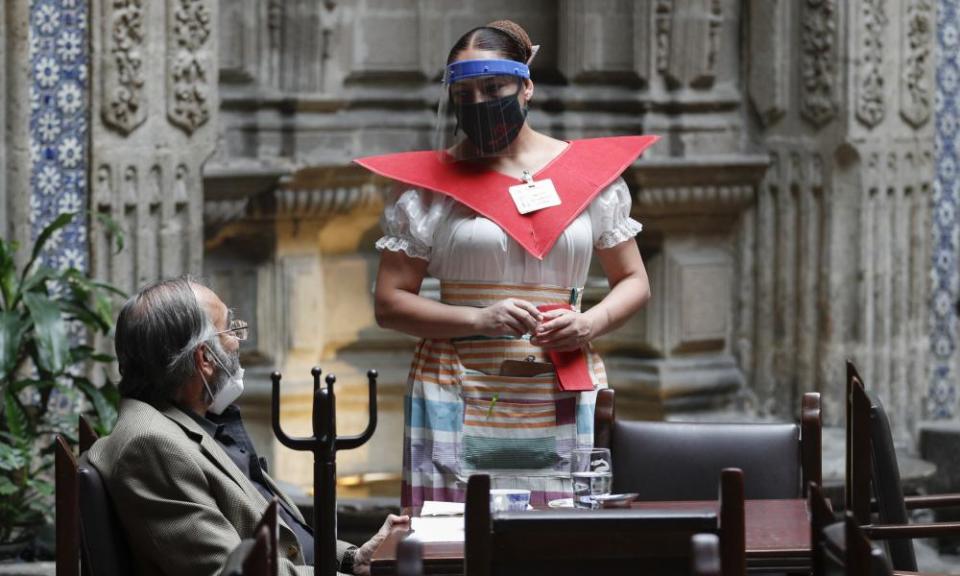‘It's a tsunami’: Covid-19 plunges Latin America back into poverty and violence

As coronavirus galloped through Latin America in late April, the mayor of Manaus was in despair. “The outlook is dismal,” Arthur Virgílio admitted as gravediggers in the Amazon’s largest city piled coffins into muddy trenches, Brazil’s death toll hit 5,500, and its president, Jair Bolsonaro, responded with a shrug. “It’s obvious this won’t end well.”
Two months later, Virgílio’s nightmare has come true. Brazil’s death toll has risen to more than 60,000 – the second highest in the world after the United States – with some now predicting it could overtake the US, where 130,000 have died, by the end of July.
Latin America – home to 8% of the global population but nearly half of recent Covid-19 deaths – is in the eye of the storm, with more than 120,000 of the world’s 524,000 coronavirus fatalities, and counting.
Meanwhile mayor Virgílio was last week rushed to hospital for non-invasive respiratory support after becoming infected. “We mustn’t underestimate Covid. It changes constantly and attacks from all sides,” the 74-year-old warned in a video from his ward. “It’s like an evil army that has organised to harm humanity.”
Four months after Latin America’s first Covid-19 case was recorded in Brazil, the region’s biggest economy is far from the only country struggling
Mexico, where 30,000 have died, has overtaken Spain as the country with the world’s sixth highest death toll – despite claims from its president, the leftwing populist Andrés Manuel López Obrador, that the outbreak had been “tamed”.
Nicaragua’s political elite has been hammered by an epidemic its authoritarian leaders are accused of trying to conceal, with at least 20 prominent Sandinistas dying after showing Covid-19 symptoms.
Peru, initially praised for its swift and strict lockdown, has lost more than 10,000 citizens, while the number of cases in Chile, Argentina and Bolivia has been rising too.
Fears that Venezuela’s already broken health system could be rapidly overwhelmed appear not yet to have been confirmed, with Nicolás Maduro’s administration recognising just 57 deaths and 6,273 cases. But many doubt those official figures, and reports suggest a worrying surge of infections in the western state of Zulia.
“The state of Zulia is teeming with coronavirus,” said Juan Pablo Guanipa, an opposition politician from its capital Maracaibo, a once-wealthy oil industry hub devastated by Venezuela’s economic collapse.
Guanipa claimed that at least six doctors and one nurse had died there, and said Maracaibo’s university hospital had “totally collapsed”.

There have been glimmers of hope. Aggressive testing has helped Uruguay, which has registered just 28 deaths, contain the virus. It is the only Latin American country named on the EU list of safe travel destinations. Paraguay has kept its death toll under 20 with a stringent lockdown. The Ecuadorian city of Guayaquil, initially overwhelmed, with corpses dumped in the streets, is bouncing back, with health brigades pursuing the virus house-to-house.
But overall the situation is bleak – and nowhere more so than Brazil, whose far-right president has undermined containment efforts, flouted social distancing and urged Brazilians to return to work, despite the number of confirmed infections last week hitting 1.5 million.
As the virus has radiated, Bolsonaro’s government has been consumed by a seemingly endless saga of political scandal and bickering, including the defenestration of two health ministers who challenged the president’s response.
“This is the government of death,” said Cristiano Rodrigues, a political scientist who, like many, blames Bolsonaro’s incoherent, anti-scientific response for the high death toll.
Last week, as the epidemic continued to rage, there was outrage as Rio de Janeiro reopened restaurants, shops and beaches, against expert advice, and photographs showed packed bars in one upper-class district.
“We can’t talk about a second wave when we’re still in the first,” the science writer Natália Pasternak told Brazilian TV. “Brazil doesn’t have a second wave – it has a tsunami.”
We could be talking about 52 million people at risk of falling into poverty
Eduardo Ortiz-Juarez, academic
As Latin America grapples with a tragedy that has yet to fully play out, there are also growing fears about the pandemic’s longer term impact on a region the International Monetary Fund expects to shrink 9.4% this year.
Tens of millions are expected to be plunged into poverty and decades of social progress erased.
“We are talking about an unprecedented shock,” said Eduardo Ortiz-Juarez, a Mexican academic at King’s College London who is studying the impact of Covid-19 on global poverty.
Ortiz-Juarez said about 72 million Latin Americans had escaped poverty during a commodity-fuelled “glorious decade” of sustained economic growth and aggressive social assistance between 2003 and 2013.
“This reversal probably won’t offset that achievement in magnitude … [but] we could be talking about 52 million people at risk of falling into poverty” he added, pointing to Mexico, Colombia, Peru and Guatemala as countries that could be particularly badly affected.

In Brazil, where the IMF predicts a 9.1% contraction, there are concerns the slump could fuel violence in what is already one of the world’s most dangerous countries, with more than 40,000 murders last year alone.
Drauzio Varella, a doctor who has spent decades working in Brazil’s overcrowded prison system, said he feared the pandemic would force already disenfranchised young people into the arms of organised crime, and brought the real possibility of “social convulsions”.
“We are going to face an escalation of urban violence in the recovery period ... and the prime reason is that people will be poorer,” Varella predicted. “I’m not saying that just because you are poor and don’t have money you will become violent – but the risk is higher.”
After many Latin American countries were rocked by protests last year, Ortiz-Juarez saw further “social outbursts” ahead depending on how long and severe the pandemic proved to be – and how individual governments responded. Beyond the economic impact, he feared long-lasting negative impacts on education, healthcare and social and gender equality.
Manaus dealt with up to 140 burials a day in May but is now one of the few major Brazilian cities that seems to be pulling through, although the virus is now sweeping across Amazonas state.
Virgílio remains in hospital, appearing in a blue hospital gown to tell supporters “this awful illness” caused a lesion that had damaged 25% of his lung. His wife had also been admitted, “suffering terrible pains in her body”. A vocal critic of Bolsonaro’s response to the pandemic, he was clear who he blamed for the depth of the disaster.
“I prefer to listen to the World Health Organization, which knows what it’s talking about, than listen to gawkers who won’t stop talking and often spread confusion rather than genuinely wise advice,” he said.

